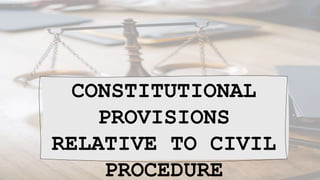CONSTITUTIONAL PROVISIONS RELATIVE TO CIVIL PROCEDURE.pptx
- 2. A. Judicial Power Defined and Its Coverage Art. VIII, Section 5. 1987 Constitution vests judicial power in one Supreme Court and in such lower courts as may be established by law. It states that: “The Judicial power shall be vested in one Supreme Court and in such lower courts as may be established by law. Judicial power includes the duty of the courts of justice to settle actual controversies involving rights which are legally demandable and enforceable, and to determine whether or not there has been a grave abuse of discretion amounting to lack or excess of jurisdiction on
- 3. B. Due Process of Law Art. III, Section 1, 1987 Constitution provides for the right of every party litigant to due process of law. It mandates that “No person shall be deprived of life, liberty, or property
- 4. C. Power of the Congress to Enact Laws Affecting The Jurisdiction of the Supreme Court Art. VI, Section 30, 1987 Constitution, provides for the prohibition for the Congress from increasing the appellate jurisdiction of the Supreme Court as provided by the Constitution without its advice and concurrence. It states that: “Sec. 30. No law shall be passed increasing the appellate jurisdiction of the Supreme Court as
- 5. D. Supreme Court Sitting As Presidential Electoral Tribunal Art. VII, Sec. 4, 1987 Constitution provides for the jurisdiction of the Supreme Court to be the sole judge of all contest relating to the elections, returns, and qualifications of the President and Vice-President. It provides that: “Sec. 4 (last par.) The Supreme Court, sittin en banc, shall be the sole judge of all contests relating to the election, returns, and qualifications of the
- 6. E. Power of the supreme court to review proclamation of Martial Law and Suspension of Writ of Habeas Corpus. Art. VII, Section 18, 1987 Constitution empowers the Supreme Court to review in an appropriate proceedings the sufficiency of the factual basis of the proclamation of martial law or the suspension of the
- 7. E. Power of the supreme court to review proclamation of Martial Law and Suspension of Writ of Habeas Corpus. It states that: “Sec. 18 (third par.) The supreme court may review, in an appropriate proceeding filed by any citizen the sufficiency of the factual basis of the proclamation of martial law or the suspension of the privilege of the writ or the extension thereof, and must promulgate its decision
- 8. F. Power of the Congress to Prescribe Jurisdiction of Courts Art. VIII, Section 2, 1987 Constitution authorizes the Congress to define, prescribed, and apportion the jurisdiction of the various courts, but may not be deprive the Supreme Court of its jurisdiction over
- 9. F. Power of the Congress to Prescribe Jurisdiction of Courts It states that: “Sec. 2. The Congress shall have the power to define, prescribe, and apportion the jurisdiction of the various courts but may not deprive the Supreme Court of its jurisdiction over cases enumerated in Section 5 hereof. No law shall be passed reorganizing the Judiciary when it undermines the security of
- 10. G. Original Jurisdiction of the Supreme Court Art. VIII, Section 5, paragraph (1), 1987 Constitution enumerates the original jurisdiction of the Supreme Court over the following cases, as follows, to wit: “Sec. 5. The Supreme Court shall have the following powers: (1) Exercise original jurisdiction over cases affecting ambassadors, other public ministers and consuls, and over petitions for certiorari, prohibition, mandamus, quo warranto, and habeas corpus.”
- 11. H. Appellate Jurisdiction of the Supreme Court Article VIII, Section 5, paragraph (2), 1987 constitution provides for the power of the Supreme Court to review cases decided by the lower courts. It states that: “(2) Review, revise, reverse, modify, or affirm on appeal or certiorari, as the law or the Rules of the Court may provide,
- 12. H. Appellate Jurisdiction of the Supreme Court (a)All cases in which the constitutionality or validity of any treaty, international or executive agreement, law, presidential decree, proclamation, order, instruction, ordinance, or regulation is in question. (b)All cases involving the
- 13. H. Appellate Jurisdiction of the Supreme Court (c) All cases in which the jurisdiction of any lower court is in issue. (d) All criminal lcases in which the penalty imposed is reclusion perpetua or higher. (e) All cases in which only an error or question of law is
- 14. I. RULE MAKING POWER OF THE SUPREME COURT Art. VIII, Section 5, paragraph (5), 1987 Constitution provides for the Rule making power of the Supreme Court. It provides that: “(5) Promulgate rules concerning the protection and enforcement of constitutional rights, pleadings, practice, and procedure in all courts, the admission to the practice of law, the Integrated Bar, and legal assistance to the underprivileged. Such rules shall provide a simplified cases and inexpensive procedure for the speedy disposition of cases, shall be uniform for all courts of the same grade, and shall not be diminish, increase, or modify substantive rights. Rules of procedure of special courts and quasi- judicial bodies shall remain effective unless













